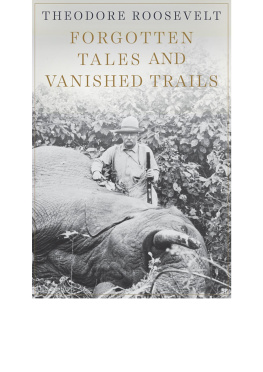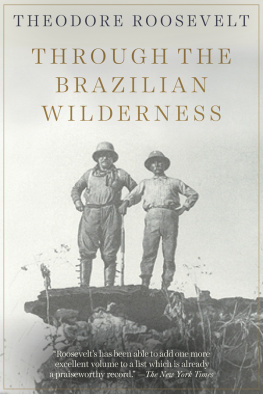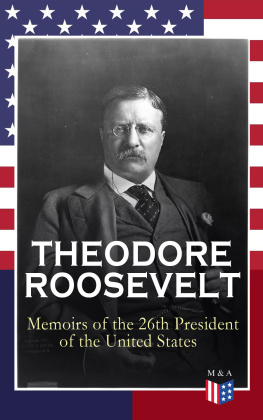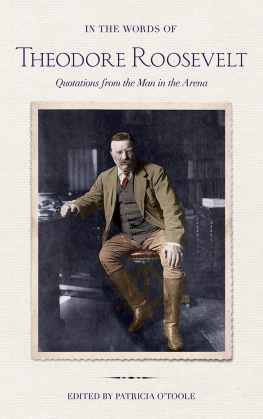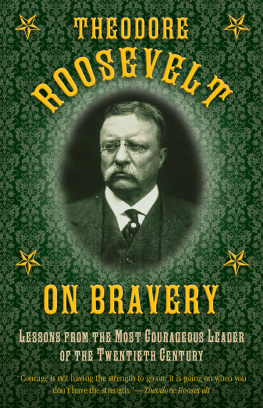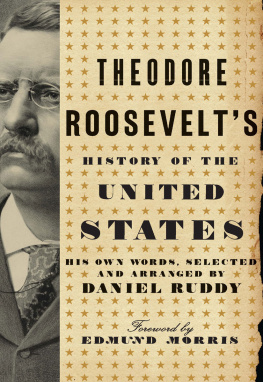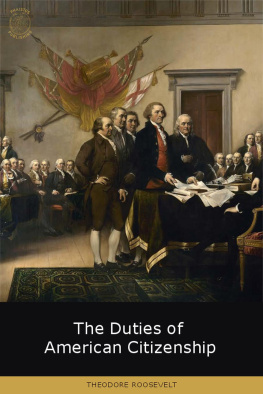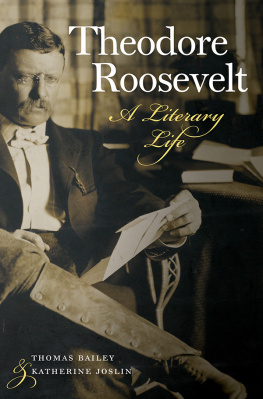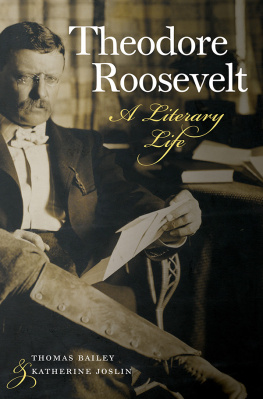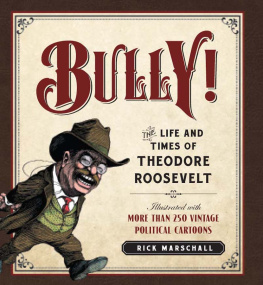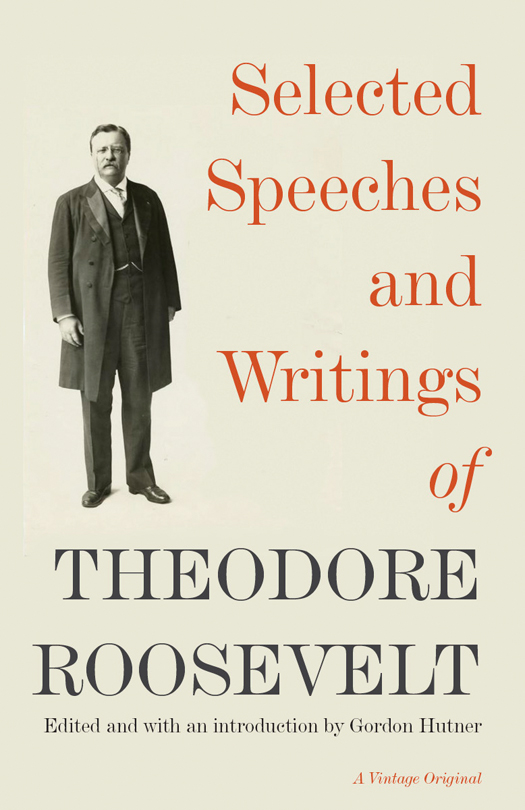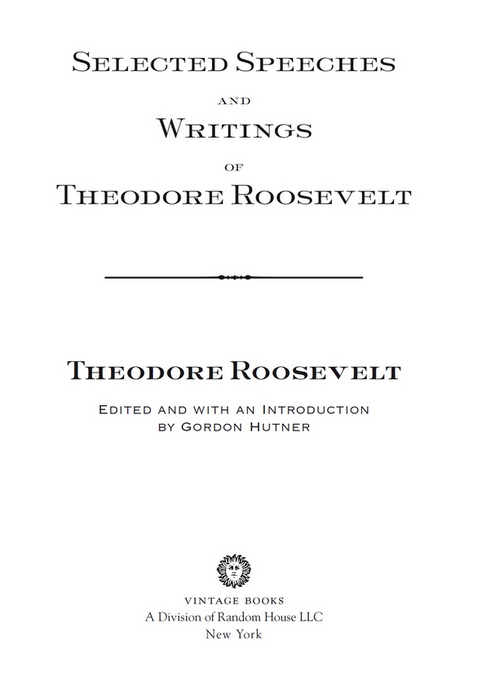A VINTAGE BOOKS ORIGINAL, JANUARY 2014
Copyright 2013 by Gordon Hutner
All rights reserved. Published in the United States by Vintage Books, a division of Random House LLC, New York, and in Canada by Random House of Canada Limited, Toronto, Penguin Random House companies.
Vintage and colophon are registered trademarks of Random House LLC.
Library of Congress Cataloging-in-Publication Data
Roosevelt, Theodore, 18581919.
[Works. Selections 2014]
Selected speeches and writings of Theodore Roosevelt / Theodore Roosevelt ; edited and with an introduction by Gordon Hutner.
pages cm
Includes bibliographical references.
1. United StatesPolitics and government18651933Sources. 2. PresidentsUnited StatesBiography. 3. Roosevelt, Theodore, 18581919. I. Hutner, Gordon. II. Title.
E660.R72 2014 973.911092dc23 2013033547
Vintage Trade Paperback ISBN: 978-0-345-80611-6
eBook ISBN: 978-0-345-80612-3
www.vintagebooks.com
Cover design by Megan Wilson
Cover photograph The New York Public Library/Art Resource, NY
v3.1
C ONTENTS
Introduction:
Theodore Roosevelt: The Man in the Arena as Man of Letters
Theodore Roosevelt:
The Man in the Arena as Man of Letters

The most prolific author among U.S. presidents, Theodore Roosevelt (18581919) wrote about a startling number of topics in nearly forty years, an energetic pace of publication that included more than forty books, numerous book reviews, hundreds of speeches, and thousands of letters. Other presidents such as Washington, Adams, Madison, and Monroe wrote eloquently, and Jefferson was a redoubtable precursor in pursuing so many various interests, from his influential political writings to the comprehensive vision of Notes on the State of Virginia. Roosevelt wrote a vigorous, often vivid prose, but he was never the accomplished stylist that Lincoln was. John F. Kennedy and Barack Obama published critically acclaimed, best-selling books before entering office, and several others, since Ulysses S. Grant set the precedent, have penned memoirs of their careers or political treatises, or both, after their retirement from public life, like Dwight Eisenhower, Richard Nixon, and Jimmy Carter, who also wrote a novel. Among autobiographies, Roosevelts is second only to Bill Clintons in the number of pages needed to tell their stories. But no other president sustained his career as a professional writer or continued to write as copiously as Roosevelt did, while also pursuing political office.
His brimming intellectual curiosity took him so many placesinto the West, foreign countries, and the pastand writing became the ineluctable expression of those abounding passions, whether it concerned nature and travel, a biography, history, politics, society, or culture. Roosevelt also published several books that compiled many of his countless articles and speeches about domestic as well as international politics and policy. He deliberated about what values historians should strive for in their historiography and tried his hand at literary criticism too, including a review of one of the first histories of American literature. Dozens of other subjects, like college football or the purposes of a university in the West, came to his expansive notice. He regularly corresponded with many of the eras most accomplished scientists, thinkers, and novelists, including Owen Wister and Edith Wharton (whose First World War charity he supported). He invited to the White House cultural luminaries as disparate as Booker T. Washington and Henry James (whom he disdained and who despised Roosevelt on principle, but who found the president engaging in person). Jacob Riis, the author of How the Other Half Lives, was a friend and confidant who wrote a biography of him.
Although Roosevelt chose to be the kind of doer he celebrated as the man in the arena rather than a mere criticas described in his 1910 lecture, Citizenship in the Republiche never fully gave up his life in letters. Even if he often disparaged what he thought of as the genteel, even effeminate character of being a literry feller, he found gratification there, not to mention sustenance. His biographers agree that for all of Roosevelts rambunctiousness and for all his commitment to the strenuous life, a significant part of him was most at home in his study, finding comfort in his lifelong habit of reading (a book a day!) and fulfillment in the act of writing (later dictating). However a matter of temperament this emotional and psychological reward may have been, it was also a matter of money, too, since under his watch his family lost much of its fortune, and he squandered away a good deal more in bad investments over the years, most notably a disastrous ranching venture in North Dakota. Roosevelt surely felt the urgency to write, insofar as his ebullient personality and searching mind enjoyed an unceasing appetite for expression, but he also needed to write for pay since his various city, state, and federal salaries did not suffice to keep his family in the style to which he had been born and to which he had no interest in becoming unaccustomed.
When Roosevelt was a young man and casting about for a career, his father let him have no illusions that, because he came from money, he could simply abjure the world of affairs and follow his early interests in natural philosophy and settle comfortably into a professorship. In the end, Roosevelt forswore academe since neither the laboratory nor the lecture hall were arenas as exciting as the outdoors, where he might collect specimens. During a college summer, he followed his avocation as an ornithologist and coauthored a well-thought-of chapbook (about birds) before he began a short, desultory stay at Columbia Law School. His dissatisfaction there led Roosevelt, newly married, to contemplate a career as a writer. He set himself the formidable task of completing a project he had begun as an undergraduate at Harvardan authoritative history of the U.S. Navy during the War of 1812. That volume reads today as a meticulous account whose lively battle narratives are weighed down by crushing detail. Yet its research and conclusions were so exact and so influential at the time that it became part of the curriculum at the U.S. Naval Academy for decades. Later, the book helped to secure his position as assistant secretary to the Navy, which he used to estimable effect, improving the countrys defenses and launching him into national prominence. The year before the publication of The Naval War of 1812 Roosevelt was recruited by Republican pols to stand for election as a state assemblyman from New York City, a position that exhilarated him. During his time in the legislature, he at last seemed to have found his calling, although politics was understood as an inappropriately grimy career for a young man of his station and looked down upon as a profession by men of his class.
So deep and abiding was his fascination with the world of the arena that he would thereafter be only a part-time author. Yet an author he certainly remained. Through the 1880s, as he continued to serve in Albany and experienced political ups and downs, he published two books about his adventures as a western outdoorsman,



